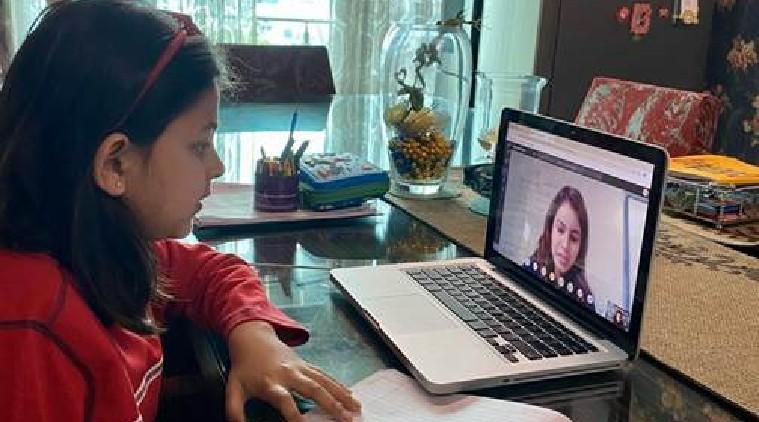Online Learning During COVID-19 Lockdown: Deepening Class and Gender Divide?

Image Courtesy: Microsoft
With lockdown, quarantine and self-isolation becoming the new normal, universities across the country are feeling the heat of the unprecedented crisis. Campuses are closed and the students and faculty members are staring at uncertainty over resumption of classes. The crisis has also brought a least discussed method for teaching to the forefront: online learning. The universities, notwithstanding requests from faculty members over concerns of connectivity and data privacy, have asked them to go for online classes to finish the courses and conduct the examinations as per schedule. But can this sail as smoothly as envisioned and directed?
Jitendra Meena teaches history at Shyam Lal College, University of Delhi. Talking to NewsClick over the phone, he said, “We see only 35% to 40% students attending owing to a slew of issues ranging from connectivity to lack of devices and what not. We were told that we could take classes over Zoom and other similar applications, but it was later found that these apps were actually stealing data. It triggered anxiety, but we started using the app anyway. Another issue is that Zoom only allows a session of 40 minutes. For the first 10 minutes, you only check if everyone has joined and whether all can hear your voice, etc. I teach a class of almost 100 students, but on your personal computer, you only see a few faces. Now, you really do not know if everyone is understanding the topic or not. At the end of the class, it feels like you have only given information.”
He added, “Another key issue is of accessibility. Every year, around 56,000 students take admission in University of Delhi. If we add 20,000 postgraduate students, we have almost 1,86,000 students who need to take regular classes. Interestingly, 70% of the students come from outside and these students are the worst affected. Some complain about connectivity, some do not have smart phones. Even if they have both, then you need a space where you can attend the class with concentration. To deal with these issues, it was suggested that we can record the classes in audio/video format and send it to the students. But here’s the glitch. If a teacher records a class in good quality video format and submits it to the university, they are apprehensive that it may be used by the university forever; which means it may shelve jobs particularly of the guest teachers.”
Another teacher, Deepak Bhaskar, who teaches political science at the university, said, “It’s professionally and morally unethical that you cannot take classes of all the students, but you have no choice. We do everything to ensure that no student is deprived of classes. The online learning comes with its own cost. In the offline classes, we engage with students to the extent that if we spot any uninterested student; we may ask him about his issues. It may be personal too. But it’s not happening now. Thirty minutes of a zoom session do not suffice to teach a single topic, leave alone the questions and discussion. So, you are taking multiple classes. Then some students ask questions to you on Whatsapp. So, it has increased our work and it is keeping us unnecessarily busy.”
To the question of apprehensions regarding recording the classes, Bhaskar said, “I am not apprehensive about my job, but there are other issues. We teach the concepts of democracy, aristocracy or for that matter women’s movement or Dalit Movement. Some may like our views, but some may also not like them. They may feel it’s threatening to their idea of nation.”
Colleges are finding it difficult to disburse salaries too. The colleges funded by Delhi University have failed to pay teachers for March and April, triggering sharp reaction from the community.
Meanwhile, the universities are also suggesting exploring the avenues of online learning and making it a permanent feature. Jawaharlal Nehru University Vice Chancellor Jagadesh Mamidala is an ardent supporter of pursuing the online learning post COVID-19. To this, Bhaskar said, “I am not against it. The times will change. But do not ignore the fact that the classroom taught students about diversity and their privileges. Classroom teaching taught students about diversity and their privileges. We saw that students come to acknowledge how casteism works in this country and we made them sensitive about it. Let me tell you a personal story. A student did not take classes for two years and failed. Why? Because she thought she was too fat. When she came to the class one day, the students asked her to come frequently and attend classes. They boosted her confidence. Finally she passed with good marks. Can you achieve it with online teaching?”
Far from the national capital, Gaurav Sikka, assistant professor of geography at Lalit Narayan Mithila University in Darbhanga, Bihar, claimed that the online mode of teaching is widening the social and gender divide. Talking to NewsClick, he said, “I teach a majority of students who hail from conservative families where the parents have no idea that the students can take classes online. Thus, they are denying the girl students access to mobile phones. Similarly, another student told me that he could not take classes because he was busy with his family in harvesting the crop. Now, even if I wish to assist this boy, I cannot because there is hardly any internet connectivity and half of the data vanishes in just one class.”
Nilanjana Gupta, professor of English at Jadavpur University, told NewsClick that the students are now opting for main subjects and abandoning the optional courses. She said, “Some teachers are busier now. Students are asking for additional sessions. In the Arts Faculty, the teaching is still going on, but we have very little clue about sciences. How they are conducting practicals or tests because it is very much practice-based.”
Also read: Maharashtra’s Prawn Cultivators Stare at a Complete Washout after Lockdown Extension
Get the latest reports & analysis with people's perspective on Protests, movements & deep analytical videos, discussions of the current affairs in your Telegram app. Subscribe to NewsClick's Telegram channel & get Real-Time updates on stories, as they get published on our website.
























